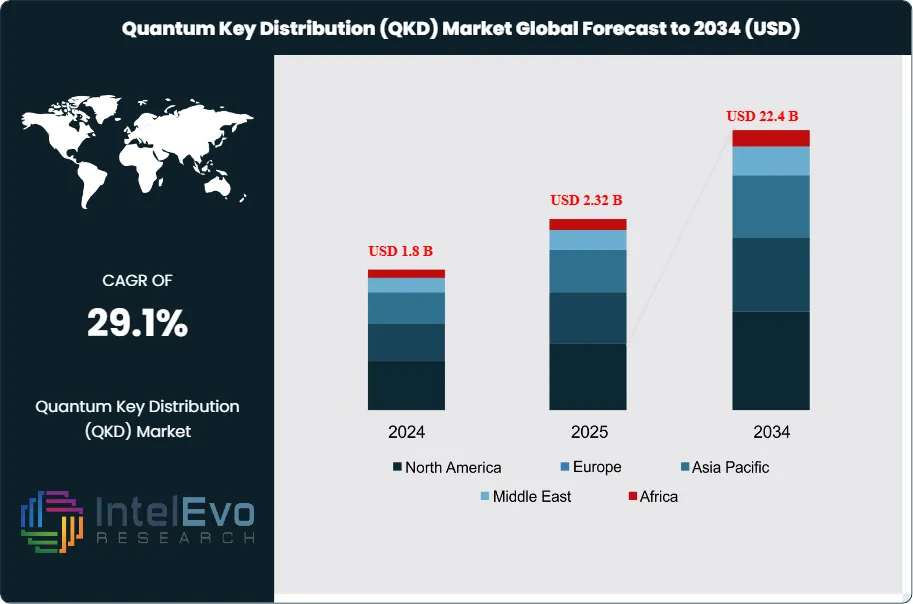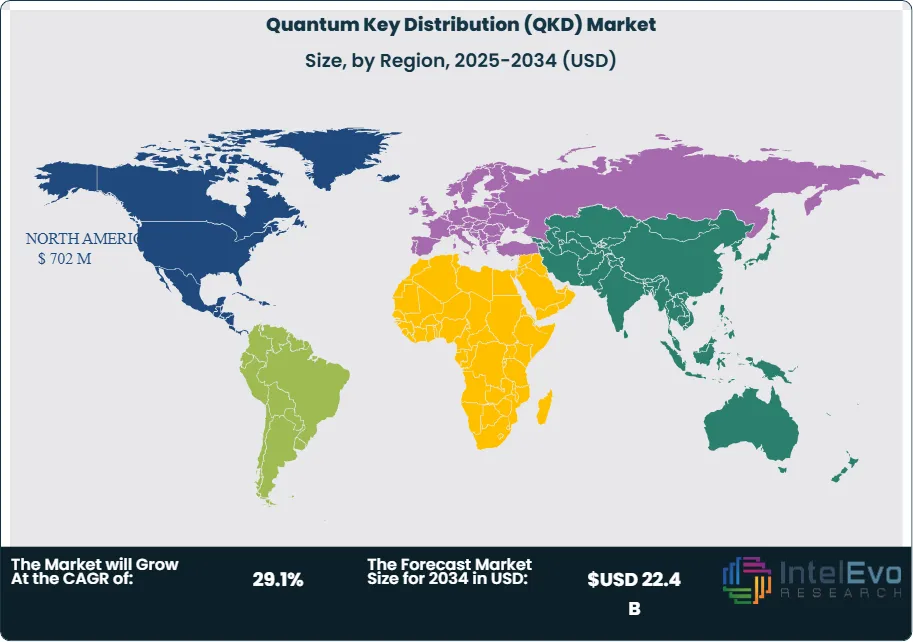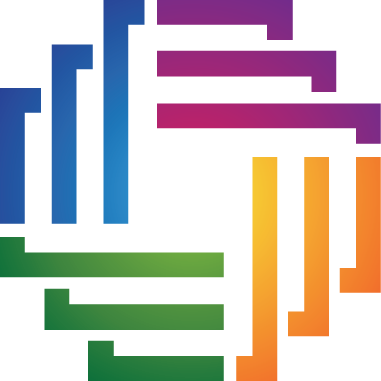
Quantum Key Distribution Market Size, Trends & Forecast 2034 | 29.1% CAGR
Global Quantum Key Distribution Market Size, Share, Analysis Report By Component (Software, Hardware), Application (Financial Institutions, Telecommunications, Government and Defense, Healthcare, Others), End-user (Government Agencies, Research Institutions, Enterprises, Others), Region and Key Players - Industry Segment Overview, Market Dynamics, Competitive Strategies, Trends and Forecast 2025-2034
Report Overview:
The Quantum Key Distribution (QKD) Market size is projected to reach approximately USD 22.4 billion by 2034, up from USD 1.8 billion in 2024, growing at a CAGR of 29.1% during the forecast period from 2025 to 2034. The market growth is fueled by rising demand for highly secure communication networks, particularly in banking, defense, and government sectors, alongside increasing concerns over cybersecurity and data breaches. Advancements in quantum cryptography technology and strategic collaborations among tech firms are accelerating adoption globally. With nations and enterprises investing heavily in quantum-safe networks, QKD is becoming a critical enabler of next-generation secure communications.

Get More Information about this report -
Request Free Sample ReportQuantum Key Distribution (QKD) is a cutting-edge technology that ensures highly secure communication by leveraging the principles of quantum mechanics. It allows two parties to generate and share encryption keys in a way that makes eavesdropping virtually impossible. The process typically involves sending quantum bits, or qubits—often in the form of photons—through a quantum channel. If a third party attempts to intercept or measure these qubits, their quantum state is altered, instantly alerting the communicating parties to a security breach. This inherent property of quantum physics guarantees that any unauthorized attempt to access the key can be detected. Once a secure key is established, it is used to encrypt and decrypt data via conventional encryption methods. QKD is gaining attention as a foundation for future-proof cybersecurity, especially as advancements in quantum computing threaten traditional encryption techniques.
The growth dynamics of the quantum key distribution (QKD) market are shaped by rising concerns over data security, advancements in quantum computing, and increasing investments in secure communication networks. As quantum computers become more powerful, traditional encryption methods are at risk of being compromised. This threat is prompting governments, defense sectors, and financial institutions to explore QKD as a more secure alternative.
North America is emerging as a key region in the quantum key distribution (QKD) market, driven by its advanced technological infrastructure, strong cybersecurity focus, and significant government and private sector investments in quantum technologies. The United States, in particular, is leading efforts through initiatives like the National Quantum Initiative Act, which supports research and development in quantum communication and computing. With growing concerns about cyber espionage and data breaches, North America’s proactive stance on quantum-safe security solutions is expected to sustain its dominance in the global quantum key distribution market.
The COVID-19 pandemic had a profound and multifaceted impact on the quantum key distribution (QKD) market. As organizations around the world rapidly shifted to remote work and digital communication, the need for secure data transmission became more critical than ever. This urgency highlighted the vulnerabilities of traditional encryption methods and accelerated interest in next-generation cybersecurity technologies, including quantum key distribution, which leverages the principles of quantum mechanics to enable ultra-secure key exchange.

Key Takeaways:
- Market Growth: The quantum key distribution market is expected to reach USD 22.4 billion by 2034, growing at a robust CAGR of 29.1%, indicating strong market expansion.
- Component Segment Dominance: The component segment is dominated by hardware, accounting for over 56% of the market share. The hardware segment in quantum key distribution includes essential components like photon sources and detectors, enabling secure quantum key transmission. It's crucial for sectors needing high data protection. The software segment manages system operations and optimization through algorithms and control tools, ensuring efficient and secure quantum key distribution performance.
- Application Segment Insights: Healthcare is anticipated to hold the largest market share.The healthcare sector is adopting QKD to safeguard patient data and ensure secure sharing of medical records. Telecommunications also plays a key role, using QKD to protect communication infrastructure from data breaches and unauthorized access.
- Driver: Increasing cyberattacks and the vulnerability of traditional encryption methods fuel demand for secure solutions like quantum key distribution.
- Restraint: The infrastructure required for quantum key distribution systems is expensive, including the need for specialized hardware and fiber-optic networks, which can deter widespread adoption.
- Opportunity: Stricter data protection laws are pushing businesses to adopt more secure communication technologies. Quantum key distribution offers advanced security, helping organizations meet compliance requirements by safeguarding sensitive data from cyber threats. This is particularly important for sectors like finance, healthcare, and government.
- Trend: Increasing efforts are being made to integrate quantum key distribution with current communication infrastructures, especially through hybrid systems that combine classical and quantum technologies for more efficient data protection.
- Regional Analysis: North America is emerging as a leader in quantum key distribution due to its strong focus on cybersecurity, government support, and tech innovation. With increasing threats to traditional encryption from quantum computing, sectors like defense, finance, and healthcare are adopting QKD to secure data. Ongoing investments and pilot projects are driving growth in the region’s quantum communication landscape.
Component Analysis:
The component segment is divided into software and hardware. The hardware segment dominated the market, with a market share of around 56% accounting for 0.9 billion 2024. The hardware sub-segment in quantum key distribution (QKD) plays a vital role by providing the essential physical components such as photon sources, detectors, quantum repeaters, and error correction units. These devices are fundamental for creating and securely transmitting quantum keys, forming the backbone of secure communication systems. As demand for highly secure data transmission grows in sectors like finance, defense, and telecom, advancements in QKD hardware are accelerating to enhance performance, reliability, and scalability.
Application Analysis:
The application segment is divided into financial institutions, telecommunications, government and defense, healthcare, and others. The healthcare segment dominated the market, with a market share of around 27% accounting for 0.4 billion 2024. Quantum key distribution (QKD) is gaining traction in sectors like healthcare and telecommunications because of its ability to provide ultra-secure data transmission. In healthcare, patient data privacy is critical, and any breach could have serious consequences. QKD ensures that sensitive medical information—such as test results or treatment plans—is securely transmitted between hospitals, clinics, and other providers, maintaining confidentiality and complying with regulations like HIPAA.
End-user Analysis:
The end-user segment is divided into government agencies, research institutions, enterprises, and others. The enterprises segment dominated the market, with a market share of around 33% accounting for 0.5 billion 2024. Enterprises in sectors such as finance, healthcare, and telecommunications are adopting quantum key distribution (QKD) to strengthen cybersecurity and protect critical data from evolving threats. These industries handle highly sensitive information—like financial transactions, patient records, and communication networks—that demand the highest level of security. Quantum key distribution provides a future-proof encryption method that ensures data privacy even against potential quantum computing attacks.
Region Analysis:
North America Leads With 39% Market Share in the Quantum Key Distribution Market. Quantum Key Distribution (QKD) is gaining traction in North America because the region has both the technological capability and the urgent need for stronger cybersecurity. As quantum computing advances, traditional encryption methods are at risk of being broken in the future. QKD offers a quantum-safe way to share encryption keys by using the laws of quantum physics—making it nearly impossible for hackers to intercept or tamper with the data without being detected. In North America, governments, defense sectors, and tech companies are investing heavily in QKD research and pilot projects. For example, the U.S. government’s National Quantum Initiative is funding various programs to develop secure quantum communication systems. Big tech firms and startups are also working on deploying QKD networks using both fiber-optic and satellite technologies. Because of its focus on cybersecurity, innovation, and infrastructure development, North America is becoming a leader in this space. The demand is especially strong in sensitive industries like finance, healthcare, and defense, where data protection is critical. As these sectors continue to grow and digitize, the need for quantum-resistant security like QKD will only increase.

Get More Information about this report -
Request Free Sample ReportKey Market Segment
By Component
- Hardware
- Photon Sources
- Detectors
- Optical Devices
- Software
- Key Management Systems
- Network Monitoring & Control
By Platform Type
- Fiber-Based QKD
- Satellite-Based QKD
- Free-Space Optical QKD
By Application
- Banking & Financial Institutions
- Government & Defense
- Healthcare & Pharmaceuticals
- IT & Telecommunications
- Others (Energy, Critical Infrastructure)
By End User
- Enterprises
- Governments
- Research & Academic Institutes
- Telecom Operators
- Other Organizations
By Region
- North America
- Latin America
- East Asia And Pacific
- Sea And South Asia
- Eastern Europe
- Western Europe
- Middle East & Africa
| Report Attribute | Details |
| Market size (2025) | USD 2.32 B |
| Forecast Revenue (2034) | USD 22.4 B |
| CAGR (2025-2034) | 29.1% |
| Historical data | 2018-2023 |
| Base Year For Estimation | 2024 |
| Forecast Period | 2025-2034 |
| Report coverage | Revenue Forecast, Competitive Landscape, Market Dynamics, Growth Factors, Trends and Recent Developments |
| Segments covered | By Component (Hardware, (Photon Sources, Detectors, Optical Devices), Software, (Key Management Systems, Network Monitoring & Control)), By Platform Type (Fiber-Based QKD, Satellite-Based QKD, Free-Space Optical QKD), By Application (Banking & Financial Institutions, Government & Defense, Healthcare & Pharmaceuticals, IT & Telecommunications, Others (Energy, Critical Infrastructure)), By End User (Enterprises, Governments, Research & Academic Institutes, Telecom Operators, Other Organizations) |
| Research Methodology |
|
| Regional scope |
|
| Competitive Landscape | QuintessenceLabs, Quantum Xchange, Toshiba Corporation, Infineon Technologies AG, QuantumCTek, NEC Corporation, Huawei Technologies, Qorvo, ID Quantique, Qubitekk, MagiQ Technologies, IBM Corporation, ISARA Corporation, Arqit, Mitsubishi Electric, Siklu Communication, Viavi Solutions |
| Customization Scope | Customization for segments, region/country-level will be provided. Moreover, additional customization can be done based on the requirements. |
| Pricing and Purchase Options | Avail customized purchase options to meet your exact research needs. We have three licenses to opt for: Single User License, Multi-User License (Up to 5 Users), Corporate Use License (Unlimited User and Printable PDF). |
Select Licence Type
Connect with our sales team
Quantum Key Distribution Market
Published Date : 18 Jun 2025 | Formats :Why IntelEvoResearch
100%
Customer
Satisfaction
24x7+
Availability - we are always
there when you need us
200+
Fortune 50 Companies trust
IntelEvoResearch
80%
of our reports are exclusive
and first in the industry
100%
more data
and analysis
1000+
reports published
till date







